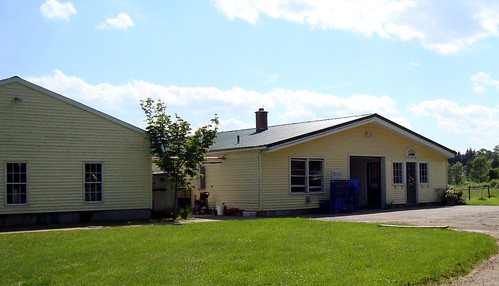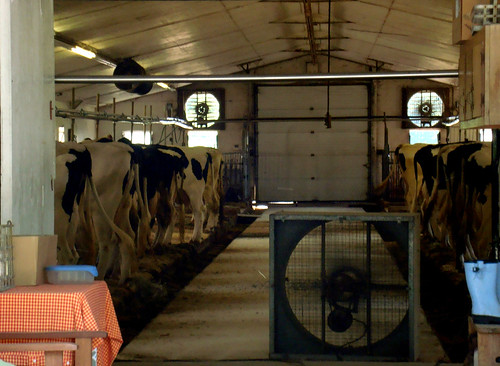 I write a lot about fast food, bizarre snacks, and mass-market processed junk, but when it comes right down to it, my family and I eat most of our meals at home and buy very little processed crap from the "center of the supermarket." In fact, we source as much of our food as possible from local producers; what we can't find locally we try to find regionally. Hey, if we can't keep our money in the local economy we can at least attempt to keep it in New England.
I write a lot about fast food, bizarre snacks, and mass-market processed junk, but when it comes right down to it, my family and I eat most of our meals at home and buy very little processed crap from the "center of the supermarket." In fact, we source as much of our food as possible from local producers; what we can't find locally we try to find regionally. Hey, if we can't keep our money in the local economy we can at least attempt to keep it in New England.A great example of this is Smyth's Trinity Farm, a small local dairy in Enfield, Connecticut, just a few minutes' drive from my home. Mike Smyth and his wife Dale have one of the last working dairies in a town where the cows once outnumbered the people, and we've been buying our milk there exclusively for the past ten or twelve years.
Their dairy herd is pastured on 25 acres of land sandwiched between Interstate 91 and US Route 5 just south of the Massachusetts/Connecticut state line, and the milk those cows produce is processed, bottled, and sold right there at the dairy. They use traditional, pay-a-deposit-and-bring-it-back glass bottles (capped with plastic caps these days - a few years ago their supplier stopped making paper caps, citing low demand.) And although the Smyth's don't make a big deal about it, there isn't anything "unnatural" in their milk. They don't use growth hormones or tons of antibiotics and they don't treat their small herd like four-legged milk factories. The girls are well treated and lovingly cared for, and on many days you can see them when you drive up to buy milk - the salesroom is in the front of the barn and the overhead door is kept wide open on nice days.
 Unless you're milking your own cow, this is about as personally acquainted as you can get with your milk supply. And if you're interested in the actual path your milk takes as it gets from moo to you, the Smyths hold Open House Saturdays a few times a year, giving tours of the processing and bottling operations and giving tastes of the milk, yogurt, cream, and butter they produce there.
Unless you're milking your own cow, this is about as personally acquainted as you can get with your milk supply. And if you're interested in the actual path your milk takes as it gets from moo to you, the Smyths hold Open House Saturdays a few times a year, giving tours of the processing and bottling operations and giving tastes of the milk, yogurt, cream, and butter they produce there.Now, a small operation is expensive to run, and the milk does cost somewhat more here than at the supermarket. But we're willing to pay the premium for several reasons:
- Trinity Farm's milk can't be fairly compared to big-brand mass-produced milk, which is blended using milks from hundreds of dairies in order to obtain a consistent and "lowest-common-denominator" taste. Single-dairy milk has a distinctive flavor - a certain uniqueness due to location, pasturing, etc. It's like comparing blended Scotch whiskey to the single-malts that go into it.
- This flavor difference really stands out when comparing like products. "Whole milk" in the supermarket contains 4% milkfat, and "low fat" milk can have 2% or 1% milkfat. Trinity's fattiest milk is their 3%, which - although lower in fat than supermarket whole milk - has a richer taste and a better flavor. Even their skim milk is better tasting than the nasty thin skim milk in the supermarket dairy case.
- Trinity's heavy cream and half-and-half are amazing - rich and flavorful, and completely lacking in the gums, extenders, and additives very often found in national brands.
- Mike and Dale Smyth know many of their customers by name. How many of H P Hood's customers do you think the CEO of Hood chats with at the dairy?
- Buying milk at the dairy not only keeps my money in the local economy, it helps ensure the future of one of the last family-run farms in my town. The Smyth's kids - adults with kids of their own now - work the farm along with their parents, and are determined to keep the farm viable and operating in the years ahead.
Smyth's Trinity Farm
4 Oliver Road
Enfield CT 06082
860.745.0751
Relevant link:
Smith Family Proud of Farming Tradition, from the Springfield MA Republican, 21 May 2008
.

the yogurt it delicious, but go and try it for yourself, it is well worth it!!
ReplyDeleteBought some of their chocolate milk at the New Haven Farmers Market in Wooster Square last week - it was THE BEST EVER!!! The Kids LOVED IT!!! We're coming back for more!!!
ReplyDeleteThank god for people like the Smyth's and Trinity Farm who practice true sustainable food production. Thank you a thousand times! :0)
ReplyDeleteJust discovered Smyth's Trinity Farm products at my local farmer's market yesterday. The yogurt and the egg nog are TO DIE FOR!!! The egg nog would make great holiday gifts. (hint,hint--and no one paid me to say this!). We plan to visit the farm SOON!Nice to know this place is SO CLOSE to home.
ReplyDelete